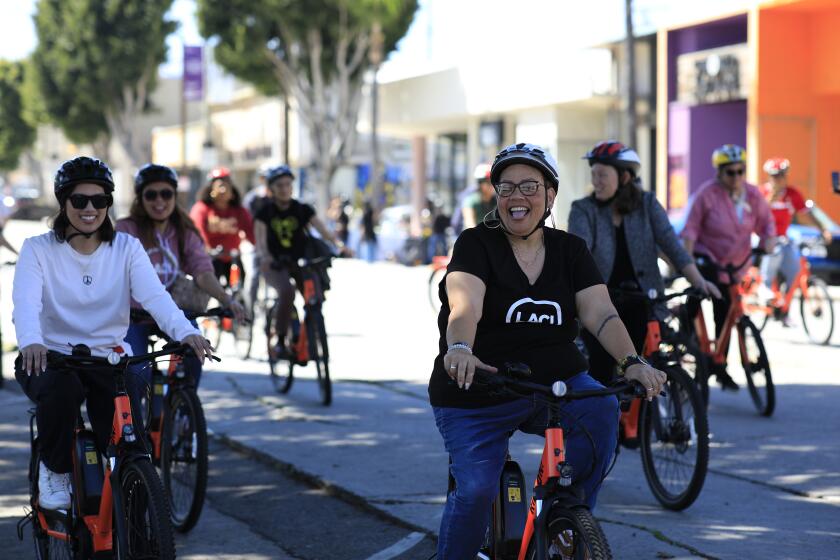Taking the initiative on traffic
Concerned that their suburban lifestyle is being threatened, residents in Ventura County’s two largest cities are hoping to put the brakes on traffic generated by future development with two separate ballot initiatives.
Oxnard activists turned in petitions last week for a proposed measure that would limit new commercial and residential development near busy intersections until existing traffic problems could be resolved.
“Our roadways simply can’t handle the number of people on them,” said Councilman Tim Flynn, one of the architects of the Oxnard Traffic Initiative. “The public is totally frustrated.”
In Thousand Oaks, professional petition gatherers are collecting signatures for an initiative that would subject a second Home Depot store and any new retail project of 75,000 square feet or more to a public vote if the project would increase traffic -- despite road improvements. The campaign is largely driven by a competitor of the retail giant but is garnering support from some residents and city officials.
“I don’t know one person in the entire city who isn’t fed up with traffic,” said Councilwoman Claudia Bill-de la Pena, who favors limited growth. “This initiative will not solve the city’s entire [traffic] problem, but it can salvage at least a portion of it.”
For years, Ventura County has enjoyed some of the strictest growth-control measures in the nation. A series of voter-approved county and municipal ordinances have been effective in confining most new development within city boundaries.
But now some Oxnard and Thousand Oaks residents worry that increasing traffic on city streets is damaging their quality of life and could reduce property values. Critics, however, argue that the proposed initiatives are too restrictive and could hurt economic growth.
Flynn, the Oxnard councilman, said the proposed anti-traffic initiative would block most commercial and housing development projects within five miles of a congested intersection, or whose traffic flow rated below a “C” grade by traffic engineers.
Flynn blames the congestion on decades of bad planning and poor leadership that allowed the city of 193,000 residents to grow beyond the capacity of its infrastructure.
“Planning decisions are not directed by planners,” he said, “but by politicians and developers, who have had their way with the city.”
But opponents said the proposed measure does nothing to solve existing traffic problems, would limit opportunities to create affordable housing and offers no exemption for religious and other nonprofit groups.
“It’s bad public policy,” said Nancy Lindholm, president of the Oxnard Chamber of Commerce. “And bad for the city and the general economy.”
Tom Cady, chairman of Citizens for a Safe and Prosperous Oxnard, said the five-mile radius specified in the initiative means all future projects in the city would be affected.
“If they said this was a no-growth ordinance, because that’s what they want, that would be one thing,” he said. “But to call it a traffic measure is just misleading.”
Officials are reviewing supporters’ petitions to determine whether there are 5,977 legitimate signatures, the number needed to qualify the measure for November’s general election.
In Thousand Oaks, plans for a second Home Depot on the site of a shuttered Kmart store at Hampshire Road just south of the Ventura Freeway have sparked a backlash in the neighborhood. The new store would be 111,000 square feet and include an outdoor garden area.
Residents Nino DeFranco and Mojtaba Sedighi are leaders of the anti-traffic measure. DeFranco said he is a regular patron of the Home Depot in the Newbury Park section of western Thousand Oaks, but thinks a second store would lead only to more traffic in an area already choked with congestion.
“Kmart was bad enough, but this [Home Depot] would be a lot worse,” he said. “I’m kind of selfish; I don’t want our property values to drop.”
But critics say the initiative is yet another anti-competition scheme by the owner of the Chatsworth-based Do It Center hardware chain, which wants to ward off a challenge by a national chain store, such as Home Depot. Do It Center has a store on Thousand Oaks Boulevard.
Jesse A. Ruf, president and chief executive of Do It Center, who has waged campaigns against national competitors in Agoura Hills and Westlake Village, is paying the petition gatherers. He declined interview requests.
But Los Angeles-based political consultant Harvey Englander, who was hired by Ruf to coordinate the initiative campaign, said local residents should be able to determine the future direction of their city.
“Home Depot is very aggressive,” Englander said. “These big competitors would love for my client to go out of business.”
Rick Principe, president of the Thousand Oaks Boulevard Business Improvement District, said if the traffic initiative passes, it potentially could hurt businesses’ attempts to expand and halt major projects underway, including creation of a long-sought children’s science center.
“This initiative is just another way of scaring the public,” Principe said. “It takes companies like Amgen and stops them from increasing the number of jobs. It’s sort of like taking a shotgun to kill a minnow.”
The Right to Vote on Traffic Congestion Initiative would subject Thousand Oaks retail projects of 75,000 square feet or more to a public vote. All projects of 100,000 square feet or greater also would be affected.
Such projects would be judged based on the anticipated new traffic they would generate in Thousands Oaks, which has nearly 128,000 residents.
The signatures of 15% of the city’s 69,000 registered voters are needed by late April to place the traffic initiative on the June ballot, or 10% to qualify for November’s election.
More to Read
Start your day right
Sign up for Essential California for news, features and recommendations from the L.A. Times and beyond in your inbox six days a week.
You may occasionally receive promotional content from the Los Angeles Times.






